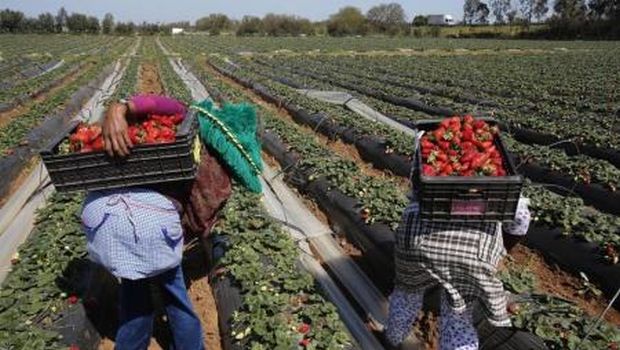
Farmers pick strawberries, to be exported, in a field in the town of Moulay Bousselham in Kenitra province, Morocco, on March 15, 2014. (Reuters/Youssef Boudlal)
Casablanca, Asharq Al-Awsat—Morocco’s Ninth National Agriculture Conference began on Wednesday in the city of Meknes as the European Union’s agriculture commissioner arrived in the country to meet with the Moroccan agriculture minister over potential changes to a joint trade agreement on Moroccan agricultural goods.
A large part of the conference—which will host the agriculture ministers of Saudi Arabia, Spain, Senegal, Mali and Côte d’Ivoire, as well as the head of the UN’s Food and Agriculture Organization—will be devoted to roundtable discussions on the country’s “Green Morocco Plan.”
The plan is a long-term strategy for rural development aiming to treble the country’s agricultural production by 2020. It will invest a total of 150 billion Moroccan dirhams (18.3 billion US dollars) in new development projects and programs in the Moroccan agricultural sector during that period.
A significant part of the plan focuses on smaller, family-run farms and solidarity agriculture, aiming to help small farmers modernize their methods to move from subsistence to commercial farming while encouraging them to pool resources in order to produce higher-quality market-grade produce for domestic and global markets.
Speaking to Asharq Al-Awsat, Mohamed El-Kroug, general manager of the country’s Agricultural Development Agency, said: “We are beginning to implement the . . . part of the Morocco Green Plan related to solidarity farming . . . [This part of] the plan will invest 20 billion dirhams [2.5 billion dollars] in 545 projects that will benefit 885,000 farmers operating small farms by 2020.”
He added: “We have now covered 84 percent of those targeted for the plan, with 492 projects already launched via investments totaling 6.2 billion dirhams [770 million dollars], and which will benefit 720 small farmers from oases and mountainous and arid areas. [Of these] a total of 30 have already been completed, and they will benefit 90,000 farmers.”
Agriculture is a major contributor to Morocco’s GDP, of which it accounts for 15 percent, according to figures from the country’s central bank. But the sector has been hit hard by adverse weather conditions in recent years, as well as by the fallout from the Arab Spring.
Meanwhile, EU Commissioner for Agriculture and Rural Development Dacian Cioloș is due to meet Moroccan Minister of Agriculture and Maritime Fishing Aziz Akhannouch on the sidelines of the conference on Wednesday to discuss changes to an agricultural trade agreement with the EU, Morocco’s biggest trading partner.
The agreement eased the entry of Moroccan fruit and vegetable products into the bloc, but its status is now threatened by proposed reforms to the EU’s Common Agricultural Policy —a system of subsidies and agricultural programs accounting for almost 40 percent of the entire EU budget.
The new measures require exporting countries to use a standard import value for produce, one that may often fall way below market prices.
Akhannouch said any change to the agreement would be “catastrophic” for sales of Moroccan fruit and vegetables, and labeled the decision “astonishing and incomprehensible.”
